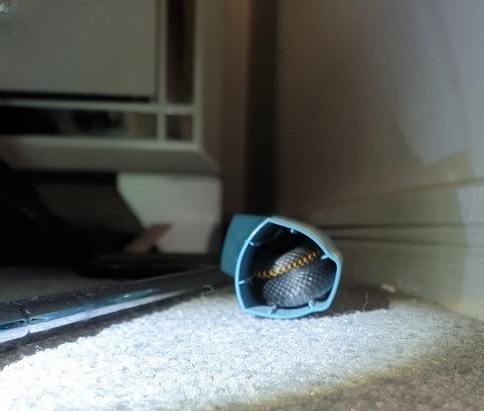Snake found in SABA inhaler
 A Queensland teenager is reported to have found a baby snake hiding inside her reliever inhaler.
A Queensland teenager is reported to have found a baby snake hiding inside her reliever inhaler.
The hatchling managed to squeeze inside the blue plastic sleeve of the salbutamol inhaler after being brought into the Bli Bli house concealed in a pile of laundry.
The tiny Red Bellied Black Snake was seen to came out of the clothing and was found by
Sunshine Coast Snake Catchers 24/7, who were called out to remove the venomous serpent.
“This is crazy and super lucky we were able to find the snake. It’s one of the most incredible places we have ever found a snake before and glad [snake catcher] Heather was able to catch and relocate it safely,” they said on Facebook.
PPI use doubles risk of CAP in kids
The risk of community-acquired pneumonia is doubled in children using acid suppressants, a Netherlands study has fund.
A cohort study using data from 84, 868 children exposed to proton pump inhibitors and/or H2-receptor antagonists and 325, 329 unexposed children found that current use of acid suppressants was associated with an increased risk of community acquired pneumonia, adjusted hazard ratio 2.05 (95% CI 1.90 to 2.22) and 1.80 (95% CI 1.67 to 1.94), respectively.
This risk increased with chronic use of acid suppressants, respiratory disease and remained increased for more than six months after discontinuation of therapy, the study investigators said in the European Respiratory Journal.
Physician chronic care model on RACP Budget wish list
The RACP is calling on government to provide more funding for telehealth, digital health record uptake incentives and a physician chronic disease care model in its Pre-Budget Submission for 2021-2022.
In its submission entitled: Reimagining Health Post COVID-19: Reform for preventive, sustainable and equitable health, the RACP makes 48 recommendations that include:
- Funding a model of care for the management of patients with comorbid chronic health conditions that formalises and supports the integration of consultant physician care (the RACP Model of Chronic Care Management or a variation).
- Additional funding for videoconferencing technology packages for priority populations to promote equitable access to telehealth.
- Maintain funding for Specialist Training Program (STP) positions while allowing for some flexibility for medical specialty variations to the recently introduced rural training requirements.
- Provide a Practice Incentive Payment for consultant physicians to support better digital infrastructure to promote access to telehealth and the delivery of integrated multidisciplinary care.
- Introduce specialist health items to the MBS to facilitate secondary consultations with GPs and other types of specialists, and allied health providers, with or without the patient present.